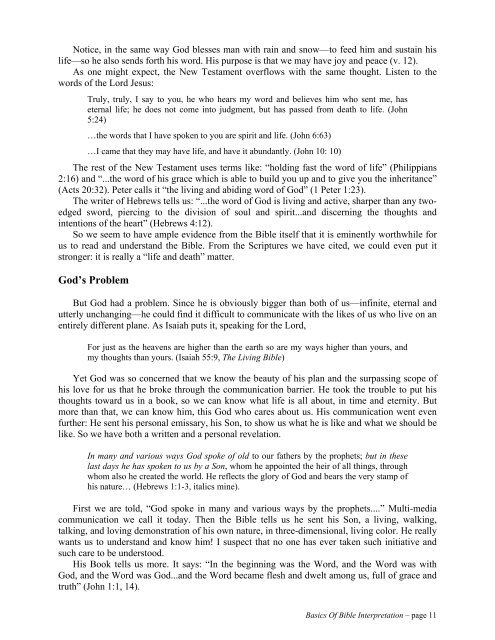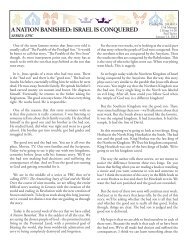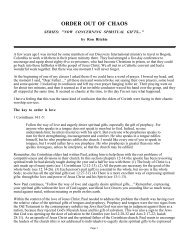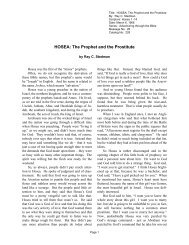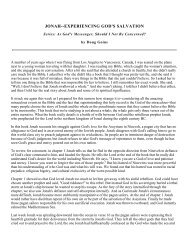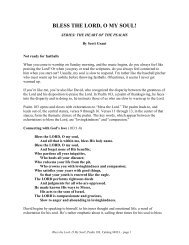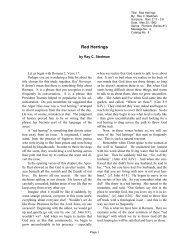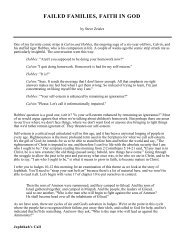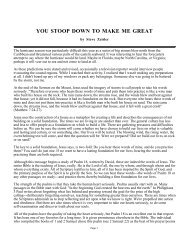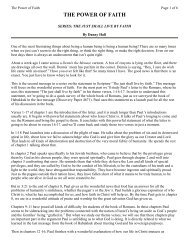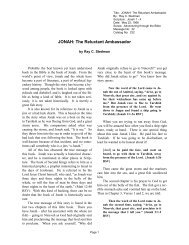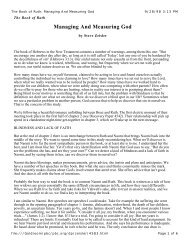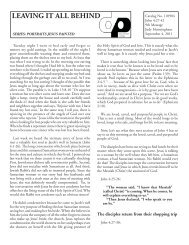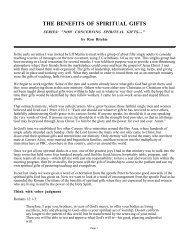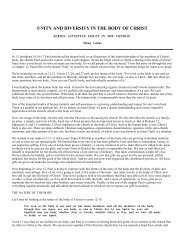Basics of Bible Interpretation - RayStedman.org
Basics of Bible Interpretation - RayStedman.org
Basics of Bible Interpretation - RayStedman.org
You also want an ePaper? Increase the reach of your titles
YUMPU automatically turns print PDFs into web optimized ePapers that Google loves.
Notice, in the same way God blesses man with rain and snow—to feed him and sustain his<br />
life—so he also sends forth his word. His purpose is that we may have joy and peace (v. 12).<br />
As one might expect, the New Testament overflows with the same thought. Listen to the<br />
words <strong>of</strong> the Lord Jesus:<br />
Truly, truly, I say to you, he who hears my word and believes him who sent me, has<br />
eternal life; he does not come into judgment, but has passed from death to life. (John<br />
5:24)<br />
…the words that I have spoken to you are spirit and life. (John 6:63)<br />
…I came that they may have life, and have it abundantly. (John 10: 10)<br />
The rest <strong>of</strong> the New Testament uses terms like: “holding fast the word <strong>of</strong> life” (Philippians<br />
2:16) and “...the word <strong>of</strong> his grace which is able to build you up and to give you the inheritance”<br />
(Acts 20:32). Peter calls it “the living and abiding word <strong>of</strong> God” (1 Peter 1:23).<br />
The writer <strong>of</strong> Hebrews tells us: “...the word <strong>of</strong> God is living and active, sharper than any twoedged<br />
sword, piercing to the division <strong>of</strong> soul and spirit...and discerning the thoughts and<br />
intentions <strong>of</strong> the heart” (Hebrews 4:12).<br />
So we seem to have ample evidence from the <strong>Bible</strong> itself that it is eminently worthwhile for<br />
us to read and understand the <strong>Bible</strong>. From the Scriptures we have cited, we could even put it<br />
stronger: it is really a “life and death” matter.<br />
God’s Problem<br />
But God had a problem. Since he is obviously bigger than both <strong>of</strong> us—infinite, eternal and<br />
utterly unchanging—he could find it difficult to communicate with the likes <strong>of</strong> us who live on an<br />
entirely different plane. As Isaiah puts it, speaking for the Lord,<br />
For just as the heavens are higher than the earth so are my ways higher than yours, and<br />
my thoughts than yours. (Isaiah 55:9, The Living <strong>Bible</strong>)<br />
Yet God was so concerned that we know the beauty <strong>of</strong> his plan and the surpassing scope <strong>of</strong><br />
his love for us that he broke through the communication barrier. He took the trouble to put his<br />
thoughts toward us in a book, so we can know what life is all about, in time and eternity. But<br />
more than that, we can know him, this God who cares about us. His communication went even<br />
further: He sent his personal emissary, his Son, to show us what he is like and what we should be<br />
like. So we have both a written and a personal revelation.<br />
In many and various ways God spoke <strong>of</strong> old to our fathers by the prophets; but in these<br />
last days he has spoken to us by a Son, whom he appointed the heir <strong>of</strong> all things, through<br />
whom also he created the world. He reflects the glory <strong>of</strong> God and bears the very stamp <strong>of</strong><br />
his nature… (Hebrews 1:1-3, italics mine).<br />
First we are told, “God spoke in many and various ways by the prophets....” Multi-media<br />
communication we call it today. Then the <strong>Bible</strong> tells us he sent his Son, a living, walking,<br />
talking, and loving demonstration <strong>of</strong> his own nature, in three-dimensional, living color. He really<br />
wants us to understand and know him! I suspect that no one has ever taken such initiative and<br />
such care to be understood.<br />
His Book tells us more. It says: “In the beginning was the Word, and the Word was with<br />
God, and the Word was God...and the Word became flesh and dwelt among us, full <strong>of</strong> grace and<br />
truth” (John 1:1, 14).<br />
<strong>Basics</strong> Of <strong>Bible</strong> <strong>Interpretation</strong> – page 11


